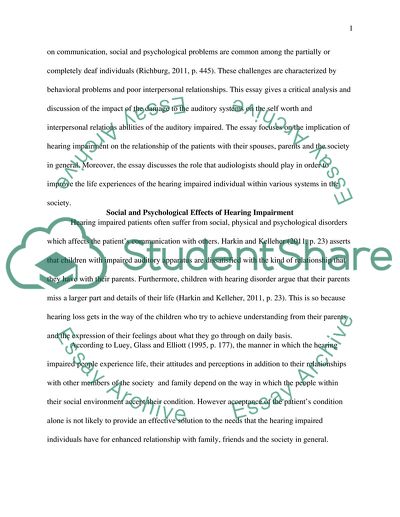Cite this document
(“Social and Psychological Impacts of Hearing Impairment and the Role of Essay”, n.d.)
Social and Psychological Impacts of Hearing Impairment and the Role of Essay. Retrieved from https://studentshare.org/psychology/1767301-our-patients-not-only-have-damaged-auditory-systems-they-also-present-with-damagedself-worth-and-strained-interpersonal-relationships-english-2000-discuss-the-evidence-behind-this-statement-and-describe-ways-in-which-audiologists-might-help-to
Social and Psychological Impacts of Hearing Impairment and the Role of Essay. Retrieved from https://studentshare.org/psychology/1767301-our-patients-not-only-have-damaged-auditory-systems-they-also-present-with-damagedself-worth-and-strained-interpersonal-relationships-english-2000-discuss-the-evidence-behind-this-statement-and-describe-ways-in-which-audiologists-might-help-to
(Social and Psychological Impacts of Hearing Impairment and the Role of Essay)
Social and Psychological Impacts of Hearing Impairment and the Role of Essay. https://studentshare.org/psychology/1767301-our-patients-not-only-have-damaged-auditory-systems-they-also-present-with-damagedself-worth-and-strained-interpersonal-relationships-english-2000-discuss-the-evidence-behind-this-statement-and-describe-ways-in-which-audiologists-might-help-to.
Social and Psychological Impacts of Hearing Impairment and the Role of Essay. https://studentshare.org/psychology/1767301-our-patients-not-only-have-damaged-auditory-systems-they-also-present-with-damagedself-worth-and-strained-interpersonal-relationships-english-2000-discuss-the-evidence-behind-this-statement-and-describe-ways-in-which-audiologists-might-help-to.
“Social and Psychological Impacts of Hearing Impairment and the Role of Essay”, n.d. https://studentshare.org/psychology/1767301-our-patients-not-only-have-damaged-auditory-systems-they-also-present-with-damagedself-worth-and-strained-interpersonal-relationships-english-2000-discuss-the-evidence-behind-this-statement-and-describe-ways-in-which-audiologists-might-help-to.


